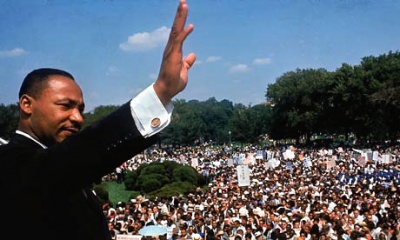Difference between revisions of "USA: Martin Luther King Jr.´s march on Montgomery and "The Freedom Highway""
(Created page with "=== 1954-56 === The American civil rights movement is one of the most celebrated and prominent examples of non-violent protest. The goal was to break down the walls of racial ...") |
|||
| Line 1: | Line 1: | ||
=== 1954-56 === | === 1954-56 === | ||
| − | The American civil rights movement is one of the most celebrated and prominent examples of non-violent protest. The goal was to break down the walls of racial segregation and bring an end to racial injustice. | + | The American [[Civil Rights Movement|civil rights movement]] is one of the most celebrated and prominent examples of non-violent protest. The goal was to break down the walls of racial segregation and bring an end to racial injustice. |
Martin Luther King Jr. was perhaps the most well-known civil rights activist. King helped lead the bus boycott of 1955-1956, which is considered to be the first great African-American non-violent demonstration. It ended after 382 days, when the U.S. Supreme Court declared the laws requiring segregation on buses unconstitutional. In 1954, he became the youngest ever recipient of the Nobel Peace Prize. | Martin Luther King Jr. was perhaps the most well-known civil rights activist. King helped lead the bus boycott of 1955-1956, which is considered to be the first great African-American non-violent demonstration. It ended after 382 days, when the U.S. Supreme Court declared the laws requiring segregation on buses unconstitutional. In 1954, he became the youngest ever recipient of the Nobel Peace Prize. | ||
Latest revision as of 08:18, 1 April 2014
1954-56[edit]
The American civil rights movement is one of the most celebrated and prominent examples of non-violent protest. The goal was to break down the walls of racial segregation and bring an end to racial injustice. Martin Luther King Jr. was perhaps the most well-known civil rights activist. King helped lead the bus boycott of 1955-1956, which is considered to be the first great African-American non-violent demonstration. It ended after 382 days, when the U.S. Supreme Court declared the laws requiring segregation on buses unconstitutional. In 1954, he became the youngest ever recipient of the Nobel Peace Prize.
The civil rights movement found strength and identity in southern gospel music and gospel music in turn fed off of the spirit of the movement. The movement?s most inspiring song was ?We Shall Overcome,? and, feeling inspired by King?s march from Selma to Montgomery, the gospel band The Staple Singers felt inspired to record the album "Freedom Highway".
